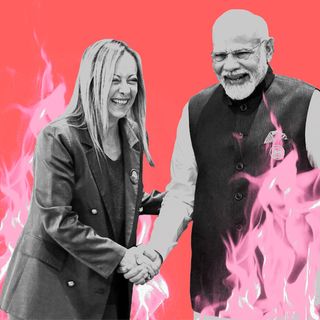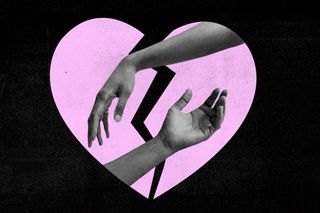
What Gets in the Way of Remaining Friends With an Ex?
Exes can remain friends, but the chances of successful friendships between exes remain low – courtesy of a host of psychosocial factors.

I once tried to remain friends with an ex. “We’d been friends before we started dating. Surely we can preserve that friendship,” I thought; I was wrong. While I approached our dynamic with the objective of remaining just friends, he saw it as an opportunity to hound me to date him again. Needless to mention, this venture was doomed to fail. But that hasn’t discouraged me from remaining platonic with others I’ve dated. In some instances, we remained on good terms and drifted apart organically, occasionally reacting to each other’s big life events on social media and exchanging pleasantries. In a few others, we’ve remained parts of each others lives. Yet public opinion largely appears to be in favor of not remaining friends with the exes. Why?
One researcher, Rebecca Griffith, found that there are four factors which prompt people to want to stay friends with an ex: civility, unresolved romantic desires, practicality, and security. How people manage to actually go through with it depends on where it stems from. It also turns out: the desire to stay friends with an ex is relatively recent in our history. It coincided with the entry of women into the workforce, birth control pills, and other forms of security and exposure which “relaxed the rules of romantic relationships considerably,” as The Atlantic put it. In other words, women and men met more often, and had to worry about accidental parenthood less — which made getting into and falling out of relationships easier and more common.
Correspondingly, research suggests that the struggle to remain friends with exes is an issue that heterosexual exes face, more than queer ones. Marisa Franco, professor and author of Platonic: How the Science of Attachment Can Help You Make — and Keep — Friends, told Vox that heterosexual people tend to “conflate all different types of love at once, platonic, romantic, sexual — so that you can’t cuddle with a friend without it seeming like it’s sexual.”
It’s the rigid boundaries between platonic and romantic love in heterosexual relationships which also leads to rigid boundaries in relationships. But regardless of sexuality, here’s another reason: while one party might seek nothing more than a platonic connection, their ex might hope the friendship will pave the path for reconciliation. ““The step from lover to friend is an eternally humiliating demotion… Every sighting of the ex is guaranteed to reignite hope, and then, further insult. One isn’t acquiring a friend, more an unwitting torturer,” philosopher Alain de Botton explained.
Naturally, when such expectations clash, finding common ground becomes challenging — with unmet expectations casting a shadow over the dynamic, and ultimately hindering the development of a healthy friendship. “If you’re trying to be friends because you’re secretly hoping to get back together, pause. This may keep you holding onto a false hope — only try to be friends if you can honestly live with the truth that you’re not together,” writes Cortney Warren, a clinical psychologist. “If you’re currently broken up, something about your relationship wasn’t working for you, your ex, or both of you.”
At times, the ending of a relationship also signals an erosion of trust. When that is the case, a person might feel unusually guarded or defensive — fearing that their ex could exploit their vulnerabilities, which might even be a legitimate concern if the ex is, indeed, trying to manipulate them to either claw their way back into the relationship, or exploit their goodwill to any other advantage. “My ex was trying to navigate his mental health diagnoses, and [kept badgering me] about my thoughts on the symptoms he was experiencing. He also kept seeking my advice on his interactions with his family. I felt like a free-of-cost therapist,” says S*.
What S.’s experience also points to are the blurred lines between what is acceptable in a friendship, and what is reminiscent of a romantic relationship; basically, post-breakup, boundary issues can plague the dynamic people share, creating confusion and discomfort.
Related on The Swaddle:
Why Romances, Heartbreaks May Impact Our Mental Health Less Than We Think
The boundaries can also get messy because of brain chemistry. One study suggested that romantic love is similar to addiction, which in turn prompts withdrawal after rejection: this means risk-taking behavior, mood swings, even obsession. Ambiguous boundaries are also the reason why it isn’t such a great idea to maintain a sexual relationship with exes — a trap that people often fall into, destroying their friendships, too, in the process. “In addition to being used as a tool to get attention from your ex, sex and orgasms release hormones and neurotransmitters into your body that can make you more attracted and attached to them,” Warren explains. “In the long run, having sexual contact with an ex often makes it even harder to move on.”
As S. experienced, for instance, unresolved conflicts from the partnership can surface in course of the friendship, too, especially if they were never addressed. This can make one feel like they’re stuck in the same loop they’d tried to escape by ending the relationship. “When we started talking again, I quickly realized why this was a bad idea. Much like when we were together, he would dump his trauma on me. But if I responded to it, he could neither deal with it, nor communicate that to me clearly,” S. adds. That’s how she realized they were falling into old patterns again.
Recommending that exes transitioning into friends create new memories in neutral spaces, instead, Franco says, “If we’re in a similar setting that we were in before, we’ll tend to act similarly to the ways that we used to act in that setting… If you’re trying to be friends with your ex, you have to think of it as a different relationship. This isn’t us breaking up, continued.”
However, with the rose-tinted glasses having come off post-breakup, people can also be less willing to put up with parts of the person they once loved. “I realized the reasons I loved her weren’t there anymore, and to me, that magnified all the aspects of her that had made me end the relationship,” says T*.
Still, others say it’s a matter of time: the immediate aftermath of a breakup can be too soon to restart a friendship, Dr. Sanam Hafeez, neuropsychologist, told Bustle. With time, the circumstances of one’s life evolves — people grow over time, their interests, goals, and priorities can shift, and they might even relocate. These changes can inadvertently distance even close friends — let alone exes — making it difficult to maintain a meaningful friendship. M.’s experience attests to this. Speaking of her ex, she says, “We were friends, but when he got into a relationship afterwards, his [original] friends and his now-partner took precedence over me.”
For M*. and her former partner, the drifting was, perhaps, an organic process. But for many others, it can be driven by external influences, too. When one or both individuals in the friendship enter new romantic relationships, jealousy can rear its head, breeding tension and insecurity. Unfortuantely, the prospect of ex-lovers reuniting — with their current partners dumped by the wayside — is bred by pop culture, too. The fear of losing one’s partner’s affection to their ex is a palpable one that often fosters unhealthy competition and emotional distress until the emotional toll of carrying on the friendship becomes too great to bear.
Related on The Swaddle:
Why It Can Be Harder to Get Over Almost‑Relationships Than Actual Ones
Besides jealous partners, society exerts pressure on individuals to conform to certain relationship norms and expectations — including not remaining friends with one’s ex. Not conforming can be met with skepticism, judgment, or even ridicule from friends, family, and peers — with the stigma, then, creating a hostile environment for post-breakup friendships, and discourage individuals from pursuing them through social conditioning. “
Unfortunately, what popular perception ignores is that there can be mutual advantages to remaining friends with exes. “When you’ve known someone intimately, you trust them and rely on them for emotional support and help,” explains psychologist Mark Travers. “Friendships that are born out of the willingness to be there for each other through difficult times are sincere. If this is the situation between you and your ex, it is unlikely that the friendship is going to spell trouble for you.”
According to T, it would, perhaps, have been possible for him to remain friends with his ex if they were on the same page, “I feel it works only if both people work on themselves to get over each other… I happened to work on myself and heal while she didn’t. So, when we tried being friends, it was super hard for her while it was a lot easier for me.” The absence of closure, then, can get in the way of transitioning into a platonic friendship since it leaves emotional wounds open and unhealed. Franco agrees, too, noting, “Doing all of that reparative work at the time of breakup is what is going to make it easier when you want to be friends after the breakup.”
It’s not for everyone, though. “Becoming friends with your ex requires emotional maturity, clear communication, and excellent boundaries,” Christine Scott-Hudson, a psychotherapist specializing in relationships, told Bustle. So, when one has achieved closure, moved on, found love elsewhere, had some time pass since the end of the relationship, it is indeed possible to remain friends — and probably, start with a clean slate, too. As a former couple told The Swaddle earlier this year, “[W]e actually didn’t talk for two years after [our breakup]. This was around a decade ago. We’re friends now.”
What often gets in the way of exes reamining friends, then, isn’t some universal law against it; instead, it is the emotional maturity and the capacity for honesty of the individuals involved, that determines the fate and consequences of post-break up friendships.
*Names concealed on request.
Devrupa Rakshit is an Associate Editor at The Swaddle. She is a lawyer by education, a poet by accident, a painter by shaukh, and autistic by birth. You can find her on Instagram @devruparakshit.
Related


Why the Pushback Against Fashion, Lifestyle Influencers Is Stronger Than Ever
